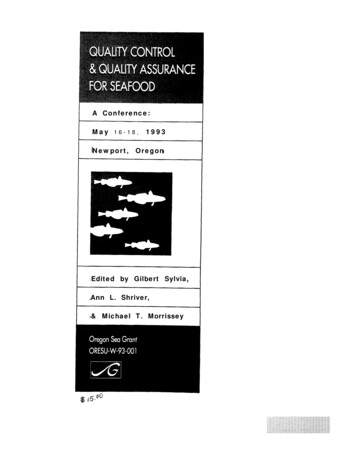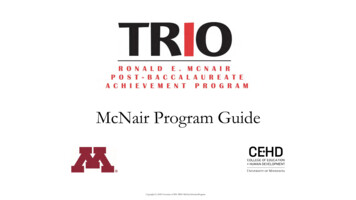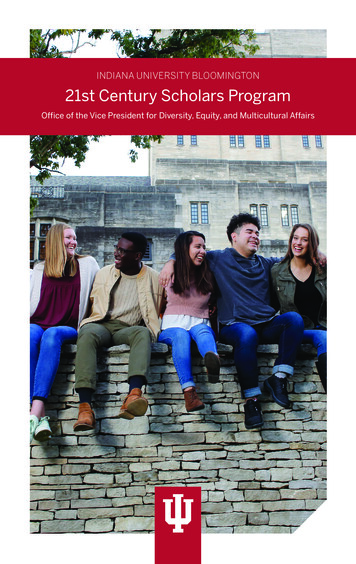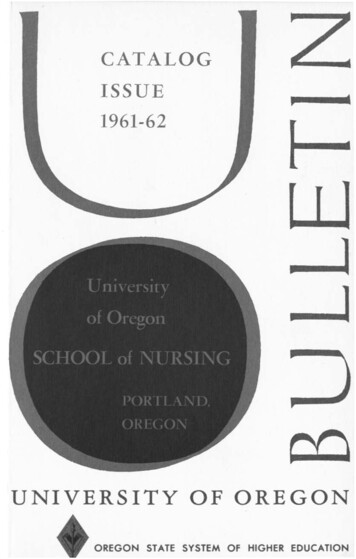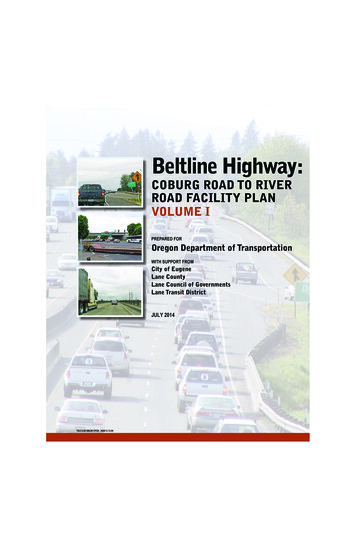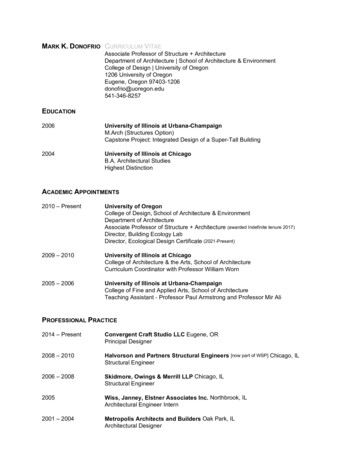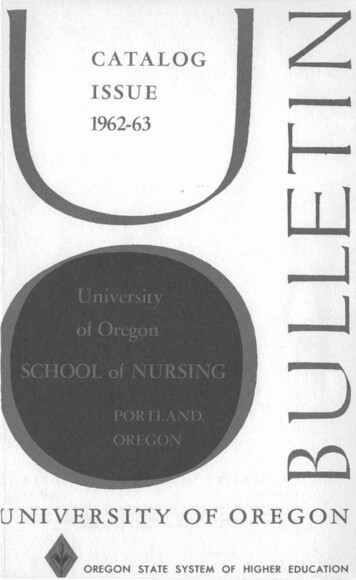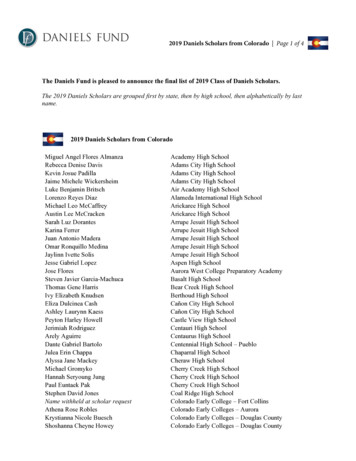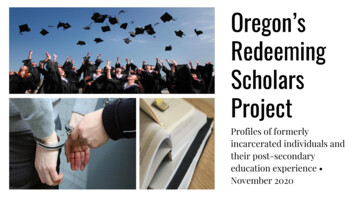
Transcription
Oregon’sRedeemingScholarsProjectProfiles of formerlyincarcerated individuals andtheir post-secondaryeducation experience November 2020
Staff members from Reclaiming Lives in Medford conductedinterviews with five males and five females, asking about theirexperience with higher education after incarceration.Post-secondary education creates substantial distance fromcriminal behavior and is the catalyst in building confidence andresilience.Having someone believe in them was what prompted enrollmentinto college.There were a considerable amount of barriers discussed, such asfear of the unknown, financial, and negative self-talk.If given the opportunity, most would continue their education onto a master’s degree or a PhD.Most of these formerly incarcerated students knew they weresmart, but had shame and trauma that held them back.
Shawn Sorenson, 37Psychology“I like encouraging youngerstudents who have limitingbeliefs”What made you decide to go to college?I was always fascinated when talking with people withcollege degrees. It was something that I wanted. My unclegot a PhD in microbiology and my grandpa had a master’sin education, but they were not really part of my life. Goingto college was self-motivated by my interest in learning.Did you have help enrolling in school and/or utilizedthe resources available?Did you have support throughout college? Were you a part ofTRIO?I received encouragement from my mom and grandma to pursuecollege but neither of my parents ever went to college. They didhelp me financially over the years.I applied for TRIO at SOU but they said my grades were too good,so I didn’t qualify. I utilized the tutoring center at SOU and I gotplugged into Community of Recovery Education (CORE) which isa nationwide program. It took me many years to graduate partiallybecause I didn’t have any help.In 1998, I graduated high school from a boarding school inMexico that was extremely strict and punitive. Theexperience there was traumatic. I learned to speak Spanishsince that was my only way to communicate.After high school, I enrolled in college in Modesto, CA. Myparents had money so I didn’t qualify for financial aid. Atthat time, I was in active addiction and didn’t do well inschool and was arrested shortly after enrolling. In 2008, Itried again but was still drinking a lot and didn’t do well.
Did you receive financial aid?Yes, eventually I filled out the FAFSA. I emailed the school andasked them what I needed to do. Some terms I finished andsome I didn’t, so I had to get my financial aid reinstated.The financial aid I received was wasted on other things duringthat time. I kept taking loans and racking up debt. I have heardabout loan payoff programs, but I know I will be paying on myloans for a long time.Did you apply for scholarships? If yes, did you have help withyour essays?I was able to apply for scholarships. I wrote essays and submittedthem. I believe in some instances I was denied because theyasked questions about my criminal history.Shawn Sorenson, 37PsychologyWhat barriers or fears did you have concerning college?In 2011, I was working at Taco Bell and in active addiction, butmy wife was pregnant, so I was motivated to do somethingdifferent. I stayed in classes through 2015 and completed a yearand a half of school which gave me enough credits for anassociate’s degree.I knew I wanted to go back and get my bachelor’s degree, but Ilet money, jobs and kids stand in the way of my education.Everything else was a priority.In the beginning I had a fear of asking questions. Now, my onlyfear is about getting a job.
Are you in school now? If money were no object, how farwould you go in school?Yes, I got my associate’s degree of general studies in 2015, andin 2020, I received my bachelor’s degree in psychology(graduating summa cum laude), with a minor in spanish. I amcurrently enrolled at Portland State University working on mymaster’s degree. Eventually, I would like to work as a mentalhealth therapist in private practice. If money and time were noobject, I would like to obtain a Phd.What added value do you think you bring to an organizationor community based on your lived experience?I think because I know what it feels like to be in the dark inaddiction and how bright the other side is, I now have an edge tonavigate through the daily stress of jobs and life. I also havecompassion for others, and I know that we each have a wholehistory behind us.Shawn Sorenson, 37PsychologyWhat benefits did you gain in going to college besideslearning?I believe college built my character, taught me to ask forhelp, and provided opportunities for friendship. I learnedhow to be an adult, take care of responsibilities, andmanage my money better. I received recognition for mygrades which built my confidence and helped me feelsuccessful.I have been able to encourage younger students who hadlimiting beliefs about what they were capable of. I alsoattended fun events and built lifelong relationships.
Sam Madden, 28Criminology“I wish I would have tried harder”Did you utilize the resources available to you?No, I didn’t access them. I was stressing at home by myselfinstead of using the resources. I know it would have madea difference in my success. I am a completely differentperson now.Did you receive financial aid or loans?What made you decide to go to college?I was in college before my addiction, right out of high school. Iwent directly to SOU. Neither of my parents went to college. Mymom had always told me that college was the only way to have abetter life.Did you have support throughout college? Were you a part ofTRIO?I did apply to Trio at RCC for a term. They also had TRIO in highschool, which is how I did my applications and scholarships.Yes, and my dad helped me. I have about 50,000 instudent loans. I spent a lot of it on “living expenses” andextravagant purchases. I bought cars and X-boxes. Peoplewho get loans need accountability, so that it gets used forschool expenses. I wish I had that.Did you apply for scholarships? If yes, did you havehelp with your essays?I applied for scholarships and I did get a few but lost thembecause I was doing so poorly. No, I did not receive help. Iwould apply and ask for help now though.
Sam Madden, 28CriminologyHow far would you like to go in school?I’d like to get my bachelor’s degree.What benefits did you gain in going to college besideslearning?I didn’t take it seriously. I wish I would have had moreaccountability.Are you in school now? How long have you been out ofschool? Why do you want to go back?It’s been 3 years since I went to school. I’ve been in recoverysince December 2019 and have 2 months clean. I want to goback so I can pay off my debt. It would take me two years if Iwent full time and focused. I have a bunch of credits that wouldcount towards my major.Originally, my major was environmental science, but I’d like toswitch to criminology.
Kelly McEvilly, 40Criminology“Learning to be a leader is newfor me”What barriers or fears did you have concerningcollege?Financial mainly and navigating the scholarship process.For me to come forward and ask for help was difficultbecause of the shame I was feeling.What made you decide to go to college?Did you have help enrolling in school and/or utilized theresources available?At the time, I was homeless with my kids, living in a shelter. Ithought I would try massage therapy. I went to a class andsomehow it led me to hear about the Human Services program. Ihad been interested in psychology so that’s what started myjourney into the program.When I was 19, I took a college placement test. I never got myGED, I just kept going on to college.I am a high school dropout who was inspired duringtreatment. My counselor brought it up to me, but thethought of going back to school was crazy. I was trying topay rent and keep my electricity on. School seemedimpossible with my kids and work. She told me I couldapply for scholarships.I did well in school when I was focused, I would have nevergone to school if that counselor hadn’t encouraged me.
Did you have support throughout college? Were you a part ofTRIO?Two months after treatment I had a relapse. It took me some timeto get back to my recovery. I decided to take one class at RCC,which turned into two. I had to take six credits successfully to getoff academic probation.TRIO at RCC was so supportive. My advisor was amazing, verysupportive. He is still always available to me. I got a tutor throughTRIO. I couldn’t believe it when I got an A in math.Did you receive financial aid?I had a loan and was on academic probation due to dropping aclass too late and owing money. I made ten payments of 5 amonth and it freed up my academic probation.There was also a loan set aside program during Obama’sadministration where they helped me clear things up with thecollege. The loans weren’t wiped away though.I didn’t know that I could dual enroll at a community college and auniversity for far less money.Kelly McEvilly, 40CriminologyDid you apply for scholarships? If yes, did you havehelp with your essays?I applied but I didn’t have help writing my scholarshipessays. I was fortunate because Maslow Project (programfor homeless) helped me go through Access to getsubsidized housing which lowered my cost of living while Iwas in school.There are two reasons people don’t apply for scholarships.One is they don’t believe they will get one and the other isnot knowing how to apply for them.
What benefits did you gain in going to college besideslearning?There is a story we tell ourselves. When we run into thesebarriers, it creates our belief system. School has allowed me to rewrite my story. The whole school process has really strengthenedme as a person.There have been so many challenges along the way. I have mydegree hanging on my wall with a vision board next to it. It feelssurreal. I’ve learned to take my walls down and have becomemore self-accepting.A combination of support and love and acceptance from othersthat has helped build my self-esteem. Giving myself grace andallowing myself to be human. There are people who make onewrong decision and they go to prison for it. I almost was thatperson. My focus everyday was on how I was going to get high.Being a student in college also persuaded the courts to drop myfines.Kelly McEvilly, 40CriminologyHow far would you like to go in school if money was not afactor?I would get my master’s degree and work in mental health.I’ve heard that there are programs that if you are in the healthfield you could go to school for free. Many resources exist thatpeople don’t know about.Are you in school now? Why do you want to go back?I am at SOU part time and work part time. School online hasbeen a challenge. I have a daughter in the sixth grade.Keeping her on track with her schooling has also been achallenge.My kids have watched me in school without having housingand it has created a growth rather than a fixed mindset. I havedemonstrated some resilience from way back when to now.My kids have seen the growth and my son has said he’sproud of me.That meant a lot to me considering where wecame from.
Manny Pacheko, 58Human Services“I want to see people do good.I believe people haven’t beentaught differently”What made you decide to go to college?Did your parents encourage school?My parents are immigrants to this country from Germanyand Mexico. They worked hard and my dad was in themilitary. They dreamed of college, but it was just a dream.I did well in school when I applied myself. You did one oftwo things in my neighborhood. Either you were a gangbanger or an athlete.Did you apply for scholarships? If yes, did you havehelp with your essays?I was working at the Mail Tribune on graveyard, living in Oxfordhousing and working with Voc Rehab. I was struggling with beingcontent and knowing there had to be more out there for me.Yes, I wrote an essay that got me a scholarship. I talkedabout what I was doing and hoping to do. I had people editmy essay. I still edit papers for my students and encouragethem to apply for scholarships. Olsrud scholarship weregreat supporters of me. I was invited to the country club.My Voc Rehab counselor said I seemed like a pretty intelligentguy and asked if I thought about going to college? She gave me alist of things to do. I took the placement test and did okay. When Iwas trying to enroll for classes I didn’t even know how to click amouse. A woman by the name of Emma from a program calledBright Futures, came out to the computer banks and said “can Ihelp you?”The OSAC scholarship asked me about my past, at thetime I was paying restitution. One board member said theywere not comfortable giving scholarship money to anyonewho was paying restitution. It was demoralizing and Istopped sharing my story after that. So much judgement inthat statement.
Manny Pacheko, 58Human ServicesWhat barriers or fears did you have concerning college?My barriers were my past and myself. There was a lot of stigmaaround addiction. I had a lot of tattoos and piercings and hairdown to my waist. There weren’t a lot of students who looked likeme. Before I got into my background, I wanted people to know mefor me. Pam Green and Denise Caldwell were mentors to me, andI would not be where I am without them. I literally asked them tobe my mentors. Without their support I wouldn’t have finished.There was no one like me.I also learned to stop disclosing because I was an over sharer.Impression Management was something I worked on for years.Making a first impression is important. People helped me with thatbecause my own best thinking had got me only so far. I was openand willing to listen.Did you have other support throughout college? Wereyou a part of TRIO?It helped that my brother enrolled in college a year beforeme. I was with TRIO at SOU and met Kathy McNeill shewas very caring and helped me.Support came from being a part of Bright Futures, as astudent worker, and my two mentors that told me aboutTRIO. I qualified for TRIO based on my learning disabilityand financial status.Did you receive financial aid?I did through Bright Futures which paid for the two semesterprogram.
How far did you go in school?I started SOU in 2005. I knew that I didn’t want to get anassociate’s degree. I knew that getting a bachelor’s and amaster’s degree would put distance between my addiction andme.My major changed a couple of times. I wasn’t sure what I wantedto do. All I knew was I wanted to help people. I loved sociology.I was working as a drug and alcohol counselor and I became asingle dad and had custody of my daughter. I managed because Iwas good at college. I was on the honor roll and rocking a 4.0. Itsurprised me at first. It helped with my recovery and self-image.My education coupled with my involvement in 12 step fellowshipsallowed me to blossom. I also have a CDAC-II.Are you in school now?I got my bachelor’s degree when I was in my early 40’s, in 2008. Igot my first master’s in 2010, in mental health counseling and mysecond master’s in 2012, in business management. Now I’mrunning the Human Services Department as Coordinator forSocial Sciences at RCC.Manny Pacheko, 58Human ServicesWhat benefits did you gain in going to college besideslearning?I will do anything to accomplish my goals. Just like I wouldhave done anything to get high. I am humble willing andteachable. I had small successes. I had to do whatever ittook.The transformation for me was when I started to do thework in my head and heart. I realized that I was good atschool. It was my dream to do something that my parentswere proud of. Being smart meant that I was a man on thecome up.
Shavonne Foster, 41Criminal JusticePsychology ofAddiction“I want to be financiallysuccessful”Did you utilize any school resources that wereavailable?No, I did it all on my ownDid you receive financial aid?Yes, I applied for FAFSA and took out a lot of loans.Did you apply for scholarships?What made you decide to go to college?I didn’t know about scholarships. I would have applied if Idid.I had been in college fifteen years ago and wanted to go back. Iwent back a total of four times.What barriers or fears did you have concerningcollege?Did you have support throughout college? Were you a part ofTRIO?Money, I was afraid of racking up more debt. I’m workingfull time because I have a 6-year-old daughter to take careof. I was also afraid of my past and how I felt about myself.My PO brought me to RCC and paid for my first term. He walkedin with a gun and a badge. His support was so important. Myparents were also supportive. They helped me financially and withbabysitting. I didn’t know about TRIO. I didn’t have any tutoring.I knew I was smart, but I didn’t have the confidence.
What benefits did you gain in going to college besideslearning?Confidence and resilience. Learning more about my likes anddislikes. School set me up for quality, everyday life skills.How far would you like to go in school?I’d like to get a master’s degree.Are you in school now? How long have you been out ofschool? Why do you want to go back?No, not yet, I received my associate’s degree this year. I justapplied to SOU to get my bachelor’s degree and ideally, earn mymaster’s right after.Earning my associate’s degree has helped open other doors. Irecently received an 11% raise for getting my degree at mycurrent job. I want to be financially successful.Shavonne Foster, 41Criminal Justice Psychology of Addiction
Ara Aguirre, 39Human Services“Little victories are how you winthe war”Did you have help enrolling in school and/or utilized theresources available?What made you decide to go to college?Ultimately, the love of my family is what changed my heart.I knew I needed to get clean. I sold my condo and was ableto buy a 4-bedroom mobile home in Medford. I movedwithin 30 days. The big homies in California let me go.After prison I released to Freedom House in Bakersfieldand went to meetings every day, got a sponsor and heardabout homies who found a new way to live. I decided to goto school because my father in law told me he didn’t knowwhat he wanted to be and he was 57. I had to dosomething to support my family. I loved service work atNarcotics Anonymous. That started me thinking about thepeople who were genuine and who needed what I had. Idecided to be a drug and alcohol counselor.Did you receive financial aid?I had a good experience with the advisors, but I didn’t get helpfrom most of them. I learned the hard way and asked thecohort in front of me. I picked their brain and asked whatclasses they were in.With FAFSA they wanted to know if you were charged witha drug offense. If so, I didn’t think I could get financial aid.I didn’t apply.
Did you apply for scholarships?I didn’t apply for scholarships and wish I had. I have 16,000 indebt.What barriers or fears did you have concerning college?Fear of failure or success if I’m honest. I worked hard onnegative self-talk and believe in the power of changing mythinking.How far would you like to go in school?I’m a lifelong student. You can’t take from me the things I know.I’m over formal college but could see myself continuing.You become obsessed with getting an A and you start shootingfor excellence instead and then learning the balance of goodenough.I had 11 hours of practicum left that I didn’t finish because ofCovid but I am now working on that online.Ara Aguirre, 39Human ServicesWhat benefits did you gain in going to college besideslearning?I’ve learned a lot about myself and what impact I can have onothers. School has been a tool in learning to celebrate smallsuccesses. Little victories are how you win the war. At the end ofthe term you have something to be proud of. I graduated with aGPA of 3.47. My plate gets bigger as I adapt and grow. I startedwith a saucer and now I have a large plate.School allowed me to learn about motivational interviewing andcoaching. Education is important because I want to effectivelyhelp people and cause no harm.We don’t have to grow just through pain. Be aware of yourthoughts and entertain them. If something needs to change, quitmaking excuses and move forward.
Leila Carlson, 48CADC“I got my schedule andbooks, then Covid hit”Why did you quit?I want to be able to raise my hand and ask for help. In myfirst class I had to tell about myself and attach anassignment and didn’t know how to do it.I spent about two hours trying and decided to withdraw andwill wait until classes open in person.I needed more encouragement.Did you receive financial aid?What made you decide to go to college?To better myself. To have a career. A woman from my peersupport class told me she was going to college and that she wouldhelp me apply. She had been in prison too. I was so excited.Did you have support throughout college? Were you a part ofTRIO?Yes, TRIO helped me apply for FAFSA and helped schedule myplacement test. I took the tests, got my schedule, got my booksonline then covid hit and I withdrew.Yes, I received full Fafsa but I needed more support. Theydeposited an extra 93 which was left after books andclasses and I paid it back. A woman on the phone walkedme through how to do that.Did you apply for scholarships? If yes, did you havehelp with your essays?No, I didn’t have time before Covid hit.
Anthony Verastegui, 28,Computer Engineering“I was a straight A student beforeI started getting in trouble”What made you get your GED?Doing the GED program did give me confidence that I cando this. You must have a minimum of two years in yoursentence to qualify to go to college. I was ready but theymake you wait before you can take the test.A lot of people are motivated and clear headed when theyget out of prison so knowing their options for college aheadof time would really help.My mom went to school for nursing and has a certificate.Did you have any school opportunities in prison?Did you enjoy school?I did not have a high school diploma when I went to prison so thatwas my first goal. It took me a while to get into the program theyhad. You had to go to school every couple of days. You would geta packet to study for an hour before you could leave. This was atSantiam Prison. It took a while to get into that program. Theymove slow there. It was hard to see my counselor and get thingsrolling.Yes, I was always a straight A student before I startedgetting in trouble. I enjoyed school and wanted to do more.I didn’t have any periods of clean time, I had 13 years ofuse and criminality.How long have you been out of prison?One year
Did you have apprenticeship opportunities in prison?Only a few prisons offer electrical and other schooling. If youdo not have over 40 months, they will not allow you to be in theprogram. They ship them to other prisons to get real lifeexperience. Change the lights in one prison, work on electricpanel in another, etc.Some inmates ask to be given a little longer sentence so theycan get into an apprenticeship program. There are very fewopportunities.Did you apply for scholarships?Not yet, but I have two mentors that said they would help meapply.What barriers or fears do you have concerning college?I have back taxes that I need to pay off. About the time I wasready to go to school Covid happened. I’m confident that if I setmy mind to it, I could be successful in school, but I have somedoubts.Anthony Verastegui, 28Computer EngineeringWhat do you think the response would be from peopleincarcerated about college opportunities?If people knew that there was a peer support based program likeProject Rebound they would be motivated to take advantage ofthat.It would be nice to get an introduction to trades or outsideopportunities. There are a lot of doubts and fears about lack ofconnection.How far would you like to go in school?I’d like to go to school for computer engineering and softwaredesign. I have been passionate about computers, coding, andcybercrimes.I’m also thinking about going to Pacific Bible College and talk tothem about scholarships. I know I have a calling in my life topeach and be able to gain knowledge of the Bible to preachconfidently.
Kristy Laschober, 55Innovation andLeadership“I wondered what else I couldaccomplish”What made you decide to go to college?I was involved in reentry court when I got out of prison. Thejudge questioned me about college. She strongly urged meto apply.I had some college credits from 30 years ago but didn’tknow what I wanted to do or how to access my oldtranscripts.Did you utilize any of the resources available?Did you have support throughout college? Were you a part ofTRIO?It took a lot of guts for me to walk into RCC. I was ashamed of mypast and didn’t know how to explain that I had been in prison forfour years. Luckily, the woman in the Financial Aid Departmentwas intrigued by my story. I will never forget her. She walkedalongside of me throughout the whole application process andintroduced me to TRIO.TRIO provided me with tutors, a place to study, computer accessand helped me with my schedule each term. I felt supported.Yes, I took advantage of all the resources, once I made thecommitment. I couldn’t believe everything that wasavailable to me. I was working full-time at a hotel in theevenings and then spent my days in class and in the tutorcenter. Tutoring helped me establish relationships as astudent.Each time I got an A on my tests, I went back to the tutorand thanked them.I really enjoyed helping the younger students get morecomfortable with asking for help.
Did you receive financial aid?Yes, I applied for FAFSA in prison, filling it out with a penciland borrowing a stamp from my cellmate. I had no idea whereit went and how to access it when I got out.Dawn, from the Financial Aid Department at RCC helped mefind my application and we learned that I was eligible for fullFAFSA.Kristy Laschober, 55Innovation and LeadershipWhat barriers or fears did you have concerning college?First of all I thought I was too old for college. I also didn’t knowwhat field I wanted to go in. I had a lot of interests though.Did you apply for scholarships? If yes, did you have help withyour essays?Accessing my old transcripts scared me too. My grades weren’tgreat because I had health issues and was always in thehospital.Yes, Dawn and Layne, from TRIO encouraged me to apply andhelped edit my essays. I received 1,000 from RCC.What benefits did you gain in going to college besideslearning?After I transferred to SOU, I applied for many, many scholarshipsand received about 8,000.I gained an enormous amount of confidence. My first math test Igot 100% and I was shocked. Gradually, I revealed parts of mypast to other students and instructors which dissipated shame. Istarted making connections with people of a perceived highercalibur and held my ground. I started to really like myself.Checking the box that indicated I had a criminal history wasdiscouraging. I didn’t know how much to disclose, what kind ofdetails they wanted. I wrote and erased my explanation severaltimes.
Curtis Ziegler,PsychologyDid you have support throughout college? Were you apart of TRIO?“Emotional and physical wellnessis attached to volunteerism”TRIO was an amazing help with financial aid, etc. They arethe ones that told me that I could move right into thebachelors program at SOU. If Project Rebound is an officesimilar to the TRIO office, then that’s amazing. I would bewilling to volunteer.Did you apply for scholarships? If yes, did you havehelp with your essays?What made you decide to go to college?I was in residential treatment at Addiction Recovery Center (ARC).A man from RCC who was very inspiring and authentic, spoke tous about going to college. I took that information and believed thatI wanted to be a drug and alcohol counselor.Six months after getting out of treatment I enrolled at RCC.No assistance, I just walked in the door and signed up.Yes. Scholarships were given to me based on myperspective on homelessness. Scholarships are veryimportant.I received 27,000 in scholarships with the help ofnumerous staff who read my letters and edited them.I was able to inspire people and give them hope.
Curtis Ziegler,PsychologyWhat would prepare formerly incarcerated individuals forcollege?When someone with a criminal background wants to pursue acareer, they should know what their limits are as far asemployment. Felons cannot hold some jobs. Someone shouldrun their background and be sure they are not limited by theircriminal record. It is important to have a direction that isattainable to help you figure it out before you enroll. You canalways start with the prerequisites.Before registering, evaluate whether you have a stable place tolive and accountability for financial aid and loans. Once you getthe loans, there are major consequences. Someone needs tolet students know about the seriousness of what they aretaking on.Stability is important – they may not be ready right out ofprison. Assistance with setting up a professional profile thatincludes a new email address and learning how to navigatewebsites.Readiness to engage is important.Did you have help enrolling in school and/or utilized theresources available?I asked for help and I got it. People need someone there tosupport them and be their ally. It needs to be about the personsucceeding not the institutions involved.What benefits did you gain in going to college besideslearning?Today I have a lot of autonomy. I’m not so much under thewings of others. I don’t think I’m the normal story. I am not surewhy this happened to me. I feel very blessed.How far would you like to go in school?I’m currently pursuing my master’s in social work and socialjustice. I would like to teach at RCC potentially.
Barriers:Fear of asking questionsOutstanding school loansRaising kidsPast mistakes/shameToo oldAccessing old transcriptsLack of computer skillsUncertain about what direction to go inNavigating the scholarship processHard to ask for helpHomelessnessStigmaWorking fu
After high school, I enrolled in college in Modesto, CA. My parents had money so I didn't qualify for financial aid. At that time, I was in active addiction and didn't do well in school and was arrested shortly after enrolling. In 2008, I tried again but was still drinking a lot and didn't do well. What made you decide to go to college?
